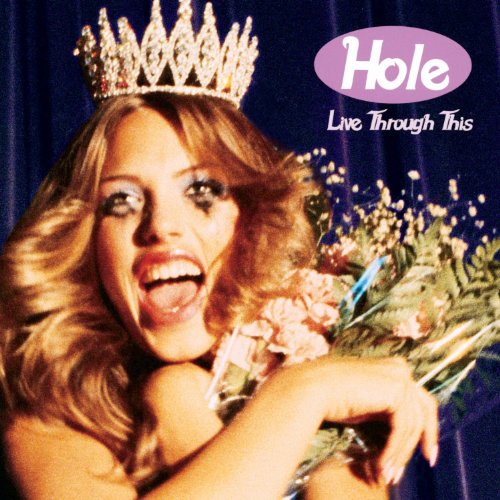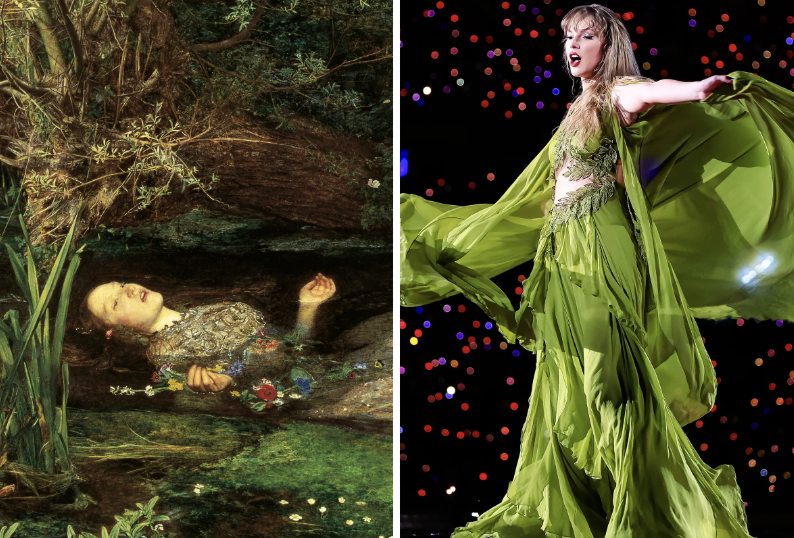Retro Review: Live Through This is 90’s female rage, uncensored
Live Through This, the second album released by 90’s band Hole, is unashamed in the way in the way it explores the darker parts of the female experience

Photo DGC
The album art for Hole’s Live Through This, featuring a Miss Congeniality winner with tears streaming down her face.
April 7, 2021
Fronted by Courtney Love, the 90’s alternative band “Hole” is one of the most famous female-led bands of the era. Love cites that the band’s name was inspired by a line from Euripides’ Medea, a play where a vengeful woman kills her children and her husband’s new bride all for the sake of spiting him. The line is “There’s a hole that pierces my soul,” but, naturally, when you look the line up you can find no trace of its existence within the play.
But the truth of the claim doesn’t matter because it serves as an embodiment of everything Hole sings about: female anger and the reality of life tucked behind Hollywood lies.
Their second album, Live Through This, was released just seven days after the infamous death of Kurt Cobain, Love’s husband at the time. It’s widely regarded as their best album, and the cover art features a model posing as a pageant queen weeping tears of joy and cheering despite all the pain she’s just put herself through. Upon first glance, it quickly establishes the thin line that Love and Live Through This walk between beauty and pain, cruel and gentle, mainstream music and screaming punk.
An all-too-common stereotype with music made by women is that it’s confessional—a diary instead of a work of art. The analytical and self-aware nature of Live Through This negates that stigma, going straight for the throat with criticisms of how women are treated both by Hollywood and the world at large.
Yes, Love frequently pulls from her own experiences, but that doesn’t diminish the work put into the album. In “Asking For It,” the song switches between self-narration and describing another girl, sticking on the topic of consent and how women are treated as commodities. In the chorus, over and over, Love sings “Was she asking for it? / Was she asking nice?” There’s no censorship, no light-hearted attitude. Love is not bearing her pains and opening her heart, but calling out that all-too-common question.
Live Through This is an album full of steep contrast, whether it’s the sudden switches from singing to screaming, or in the motifs themselves. Common ones in the album are dismemberment (“Doll Parts,” “Jennifer’s Body”), motherhood (“Plump”) and milk (“Softer, Softest”). Love switches easily from singing about the struggles of raising her newborn daughter in the limelight to the story of a girl kept locked inside a box as she’s dismembered, a song that would later inspire the cult horror-comedy Jennifer’s Body.
One of the most stand-out songs is “Doll Parts,” a track about Love’s tumultuous marriage to Cobain. The intro is soft, Love crooning “I am doll parts” and separating each part of her body from the whole, representing how the media only sees the parts of her, not who she actually is. There’s ambition laced in lines like “I want to be the girl with the most cake,” where Love views herself from an outside point of view; it’s not who she is, it’s who she wants to appear to be so she can keep up with Cobain’s public image.
The song is generally quieter than other tracks on the album, the chorus built by the line “someday you will ache like I ache” sung over and over. When suddenly, at nearly the three-minute mark, Love switches to rough screaming as the guitar crashes in, singing once more “someday you will ache like I ache.”
It’s not a threat, it’s a promise; a call back to the very play Hole steals its name from. Love is the Medea, promising her lover that someday he will hurt as she does.
The opening song of the album, “Violet,” captures the vibrant essence of Live Through This best, immediately setting a scene with the lyrics “and the sky was made of amethyst.” It’s deceptively soft for a band that made their name on Love’s screaming, but that doesn’t matter, because Hole can and will be both the rose and the thorn. Quickly, the song shifts to a narrative of a physically abusive relationship, where everything is all “violet” and “violent.” It’s morbid for an opener, but Love sings it all with a heady glee in her voice.
In the chorus of “Violet,” Love screams “Go on take everything / Take everything / I want you to.” She’s not asking the listener; she’s commanding them. Live Through This did everything it wanted with no holds barred, cementing its place as an album that will be worth a listen long after the lights of Hollywood fade out—as long as you have the stomach to bear it.










